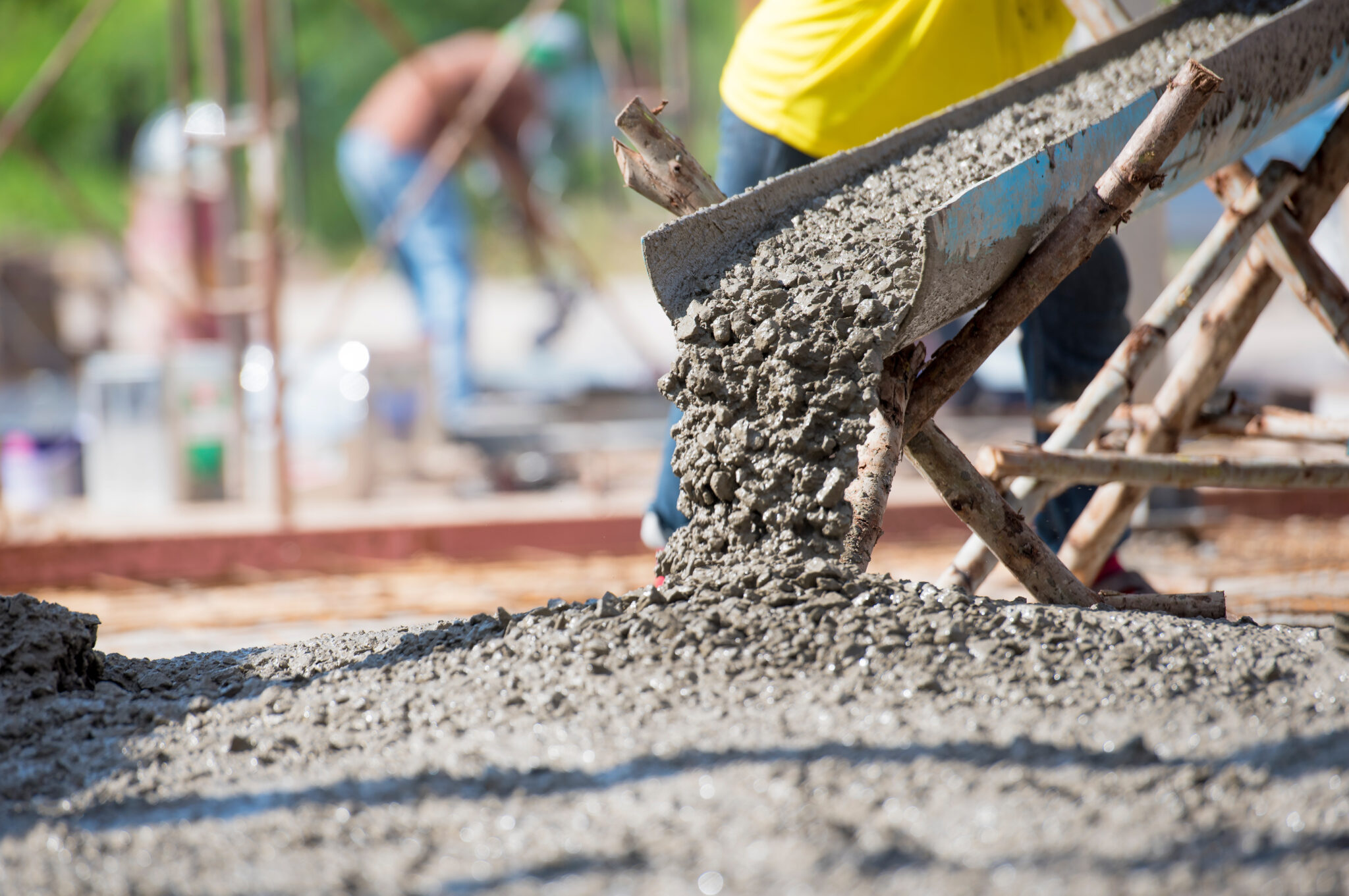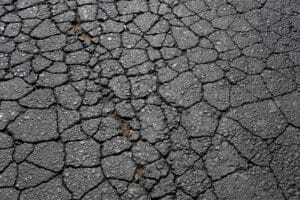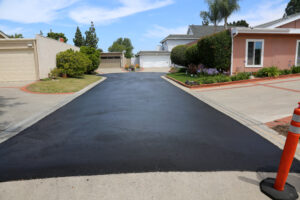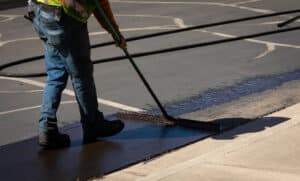Choosing the right material for your driveway is a big decision. It not only affects how your property looks but also how it functions. In this blog, we will explore two popular options – concrete and asphalt driveways. We’ll discuss factors like installation cost, lifespan, and maintenance requirements. By considering these factors, you can find a driveway material that not only aligns with your budget but also complements your unique lifestyle and enhances the overall value of your property.
Key Differences: Concrete vs Asphalt Driveways
Before we dive into the specific aspects, let’s highlight some key differences between concrete and asphalt driveways.
Asphalt Driveways
Asphalt is a mixture of bitumen (a dark, sticky form of petroleum), sand, and fine crushed stone. This composition gives asphalt driveways their distinctive black color. The materials are heated and mixed, then spread and compacted onto the driveway while still hot. Once cooled, the asphalt hardens into a durable surface capable of withstanding heavy loads.
Below are some advantages of asphalt driveways:
- Cost-Effective: Asphalt driveways typically cost less to install than concrete driveways.
- Quick Curing: The curing process for asphalt is faster, which means you can use your driveway sooner.
- Winter Friendly: Asphalt is more durable to weather changes, making it ideal for cold climates.
- Easily Repaired: Cracks and damage on asphalt driveways can be easily filled and sealed.
- Recyclable: As an environmentally friendly option, asphalt can be recycled for future use.
Despite these advantages, asphalt driveways also have some disadvantages. Here are the main ones to consider:
- Frequent Maintenance: Asphalt driveways require sealcoating every 3-5 years to maintain their durability and appearance, which can add to the overall cost.
- Heat Sensitivity: Asphalt expands and contracts with major temperature fluctuations, which can form cracks on the surface.
- Shorter lifespan: Although they can be repaired easily, asphalt driveways generally have a shorter lifespan than concrete driveways.
Concrete Driveways
Concrete driveways are primarily composed of cement, aggregate (sand, gravel, or crushed rock), and water. Cement is produced from materials rich in calcium, usually limestone, combined with clay, silica, alumina, and iron ore. Cement acts as the binder in concrete, binding together the aggregate to form a strong, resilient structure when mixed with water and left to cure.
Once these materials are mixed, they are poured into a prepared surface and allowed to harden, forming a durable, long-lasting surface. The color of concrete driveways can vary depending on the type of aggregate used, but it often has a light, creamy color. Concrete driveways can also be stamped, stained, or textured to create a unique and personalized look.
Here are some pros of concrete driveways:
- Longevity: When properly installed and maintained, a concrete driveway can last up to 50 years.
- Design versatility: With options for stamping, staining, or texturing, concrete driveways offer incredible design versatility, allowing homeowners to customize their driveway’s look.
- Heat reflectivity: Concrete driveways reflect sunlight rather than absorbing it, helping to keep the surroundings cooler during hot weather.
- Low maintenance: Concrete driveways require less frequent maintenance compared to asphalt. Regular cleaning and occasional degreasing every few years are usually all that’s needed.
However, concrete driveways do have some drawbacks:
- Cost: Concrete driveways are typically more expensive to install compared to asphalt. The final cost can increase significantly if you opt for decorative options.
- Time to cure: Once installed, concrete driveways take a longer time to cure before they can be used, usually around a week.
- Stains and marks: Concrete tends to show oil stains and tire marks more prominently than asphalt. While these can be cleaned, it may require more effort and potentially professional cleaning services.
- Cold-weather damage: In regions with severe winters, the freeze-thaw cycle can lead to cracks in concrete driveways. Using salt to melt snow or ice can cause the surface to pit and ravel.
The decision between concrete and asphalt will depend on your budget constraints, aesthetic preferences, and the climate of your region. Both options have their pros and cons, and the ultimate choice should be based on which factors are most important to you.
Cost Comparison of Concrete and Asphalt Driveways
On average, an asphalt driveway will cost $6-$10 per square foot, depending on the material used. However, it’s important to remember that asphalt driveways require sealing six months after installation and resealing every three to five years after that. The cost of sealcoating varies by region but is usually between $0.08 – $0.30 per square foot.
Concrete driveways come with a higher initial cost, typically between $12-$20 per square foot. If you desire a custom finish or color, these costs can rise significantly. The good news is that concrete driveways require less frequent maintenance – a professional cleaning every few years should suffice. The downside is that if your concrete needs significant repairs, it can be complex and costly when compared to asphalt repairs.
In the long run, the total cost can be quite close when considering the maintenance needs of asphalt. So, while the upfront costs of a concrete driveway are higher, homeowners may save on maintenance costs over time.
Driveway Durability and Maintenance: Asphalt vs Concrete
When it comes to durability, asphalt and concrete driveways have different strengths. Asphalt driveways are quite resilient to freezing and thawing cycles, making them a good choice for cold climates. Concrete is more prone to cracking in cold temperatures, although it handles heat better.
Maintenance for both types of driveways revolves around ensuring their longevity and appearance. For asphalt driveways, regular maintenance includes sealcoating, crack sealing, and cleaning. Sealcoating protects the asphalt from water, sun damage, and fluids from vehicles, helping prolong its lifespan. Crack sealing helps to prevent water from seeping into the base material and making the damage worse. If left alone, these small cracks can develop into large potholes, requiring costly repairs. Regular cleaning is one of the most simple ways to extend the life of an asphalt surface and keep it looking fresh.
Concrete driveways require less frequent maintenance but require a more cautious approach. Regular cleaning and the application of a high-quality sealer every few years are usually enough to maintain the surface. However, if cracks do appear, they should be filled immediately to prevent further damage. If cracking or surface discoloration occurs, resurfacing or applying a decorative overlay might be required to restore the driveway’s appearance.
Choosing the Right Material for Your Driveway
When choosing the right material for your driveway, several factors come into play, such as cost, durability, maintenance, and aesthetics. When making your decision, consider your geographical location and your budget for both installation and upkeep. Whether you prefer the more hands-on approach of asphalt or the comparative ease of concrete, both materials can provide a durable, attractive driveway with proper care and maintenance.
Some homeowners go for a mix of asphalt and concrete in their driveways. It’s a cost-effective option, especially for longer driveways. A typical approach is to have a solid concrete apron of around 20-30 feet outside the garage and at the curb where the driveway meets the sidewalk. The remaining area is then filled with asphalt. This gives you the best of both worlds – the durability and appearance of concrete where it counts and the cost-effectiveness of asphalt for the rest of the driveway.
Get an Asphalt Maintenance or Repair Quote Today
Both concrete and asphalt driveways offer unique advantages and drawbacks. Your choice depends on various factors like budget, climate, desired aesthetics, and maintenance willingness. Weigh these factors to select the best option for your home, enhancing its functionality and appeal. Don’t hesitate to consult with professionals for expert advice and assistance in making the right decision. If you decide on an asphalt driveway, perform regular maintenance to make sure your pavement lasts. At Superior Asphalt, we provide top-notch materials and asphalt maintenance services to keep your driveway in top shape. Contact us today for a quote!




